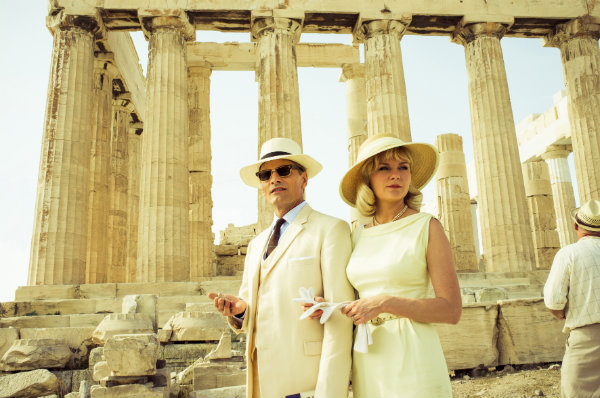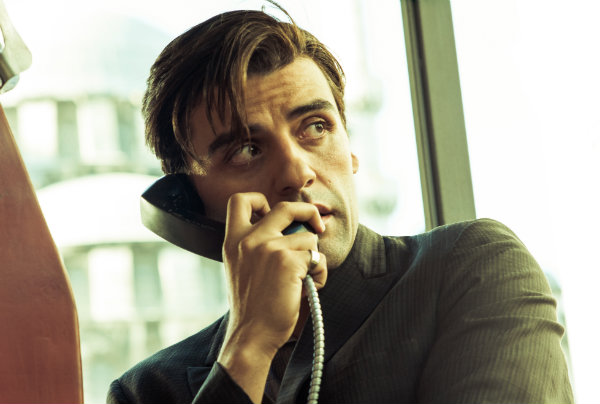Continuing in the tradition of Patricia Highsmith’s set of globetrotters and vacationing daytrippers who dip their toes not only in foreign backdrops, but in tend to find themselves in the most inconvenient of situations, it is the American novelist’s 1964 novel that finds a suitor in British-Iranian writer (and now turned director in his own right) Hossein Amini.
Working with players such as Viggo Mortensen, Oscar Isaac and Kirsten Dunst, Amini, whose long list of creds include Michael Winterbottom’s Jude, Iain Softley’s The Wings of the Dove, Shekar Kapur’s The Four Feathers, Nicolas Winding Refn’s Drive and the upcoming Our Kind of Traitor, takes a stab at the thriller-genre with the sun-drenched Greece and Turkey as the conniving backdrop with The Two Faces of January, which opened August 28th and is still running in its limited engagement. Here is my interview with Amini which took place at the 57th San Francisco International Film Festival.
Yama Rahimi: What took this long to make your directing debut and why this film?
Hossein Amini: It took me this long because I could never get this particular book which I always loved and wanted to do as a first film but never happened. So many things happened along the way, I wanted to buy the rights which I wasn’t able but then I met someone who could but I met a deal with Miramax but they weren’t interested in this. Then Anthony Minghella and Sydney Pollack were going to produce it but sadly they passed away so it didn’t happen. I was always going back to it and really wanted to do it and took almost twenty years to get it made. I tried to get the rights after Jude (1996).
Rahimi: I have been watching your career very closely which is very eclectic from literature novels by Thomas Hardy and Henry James to genre pieces like Drive. How do you select your projects?
Amini: I always loved movies and watched all kinds of genres. I have my favorites like film noir and thrillers but I love the excitement of doing something new and explore that particular genre.
Rahimi: How does the collaborating process work?
Amini: I’m sent books which someone has commissioned and if I want to do it, I have to pitch for it. For Drive I was sent the book and loved it but they were also talking to other writers as well. So that’s how it works. I would love to do a spec but I’m too insecure about it because I have three kids.
Rahimi: I loved The Talented Mr Ripley and Purple Noon both adapted from the same novel by Patricia Highsmith. This film is very structured with a tight pace. What was the challenges of adapting and directing it?
Amini: The challenges with all Highsmith novels are that she writes characters which I find fascinating because they are complex and dark. They are never black and white, so one moment you like them then you don’t but she doesn’t really create characters that people root for in traditional sense. That was what was interesting for me and challenge was to make sure the audience would be interested in this characters. Therefore the key was to find actors that were likeable so audience would go on the journey with them. So it was a constant challenge to make the characters compelling and heroic in their own way.
Rahimi: I found the chemistry between the characters very interesting from a love triangle to father and son aspect. So you don’t know which way the story would go.
Amini: That’s so fantastic about Highsmith as a writer that she captures male dynamics so well. That a man can admire somebody but also be in competition with, particularly younger man with older man and the way they fight over a woman. It’s often not about the woman but beating each other specially coming from a female writer who understands the male psyche so well. That’s what I remember reading the book to see elements and ugly side of myself in this characters specially in a crime book. It’s not about the characters but yourself as well to recognize those darker emotions.
Rahimi: What were some of the challenges during the production?
Amini: The first challenge was the location itself. I felt the Greek locations with its sun drenched settings were part of the story. Because of troubles in Greece we looked at locations in Croatia and Turkey but it wasn’t the same. I felt the Greek landscape was crucial to the characters with its stark contrast reflecting their emotional landscape. Once we got there, there was trouble and strikes and problems with permits and so on but the crew was so fantastic that it made fun to shoot.
Rahimi: I think the story has elements of a Greek Tragedy which is reflected in the landscape with all the marble and bright sun.
Amini: I always loved the Greek mythology as well and these characters are not bad people but they are human. These people are unlucky. That’s what I love about crime films where people get caught in corruption and the gods punishes them or fate intervenes and their lives spirals out of control and dreams turn into nightmares.
Rahimi: These are universal themes that everybody can relate to.
Amini: Right. That’s why I was drawn to this book. It’s not the most perfect book and her plotting is not always perfect but she’s so interested in psychology and going deeper into mythology. That’s what I found so unique about the book.
Rahimi: What did you change from the book for the film?
Amini: The ending in the book is in Paris but I changed it to Istanbul because I felt the characters have to get further away from home which is America. I always felt to go from Greece to Paris would be almost going home towards America. I wanted to get them further and further east. What I found fascinating about Istanbul is the sounds which was another way to punish the characters. Since I also love film noir, I found Istanbul such a great city for film noir setting.
Rahimi: I loved how it started from open spaces in bright sun going into darkness with the corridors and alleys.
Amini: The visual world of the film changes when the characters change, from cliche sunny postcard scenes of Athens to the dusty and stark scenes in Crete where the landscape is punishing them before ending up in the dark alleys of Istanbul.
Rahimi: Tell me about your cast Viggo Mortensen, Kirsten Dunst and Oscar Isaac and how their casting came about?
Amini: Well Viggo (Mortensen) is the reason the film got made. I really struggled for a long time. He read the script and loved it. I wasn’t aware he was reading it. Then I got a message that he liked it and wanted to meet. Once he was onboard we went out to get the financing. I worked with Oscar on Drive was on board before he was cast in the Coen brothers film, then everybody wanted him. With Kirsten I wasn’t aware she was reading it but she persuaded me that she could make the character more interesting than it was in the book and script. She brings intelligence and sensitivity to the character. In the book she’s unconscious about what goes on.
Rahimi: I think she brought chemistry and tension between the characters which made the stakes even higher.
Amini: She brought the fragility. Here’s the woman who marries a guy she thinks is rich and would give her a life of luxury in New York but ends up on the run in Greece. She basically wants to go home.
Rahimi: What films inspired you?
Amini: I remember Robert Aldrich’s Kiss Me Deadly on a big screen in Paris and I never seen a black and white film on big screen which blew me over. I could watch Chinatown again and again. Vertigo is another one of my favorite movies. I love mainly film noir but also European films of the 60s. I love the films of Jean Pierre Melville. I quite like films that are more silent than with much dialogue. There’s something about the minimalist style that I love.
Rahimi: How did you become a writer?
Amini: I wrote and directed couple of short films but once I became a writer, people were reluctant to hire me as a director. I had to impose myself to say that I really wanted to direct.
Rahimi: Now that you have directed would you like to write or direct more?
Amini: It’s not up to me but I would love to direct but as a writer I only need my laptop to write.
Hossein Amini’s The Two Faces of January (was released via Magnolia Pictures on 28th August 2014).




